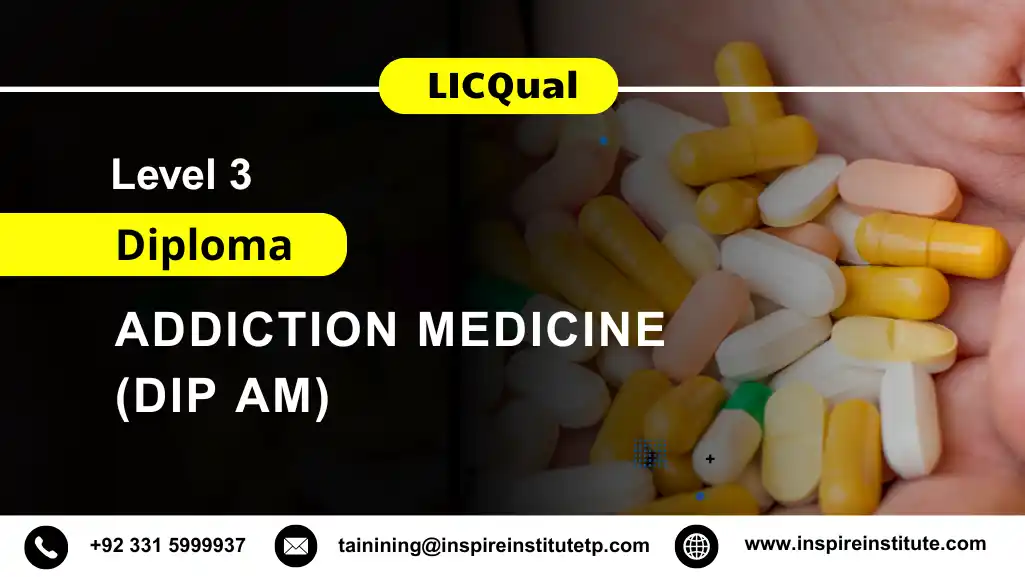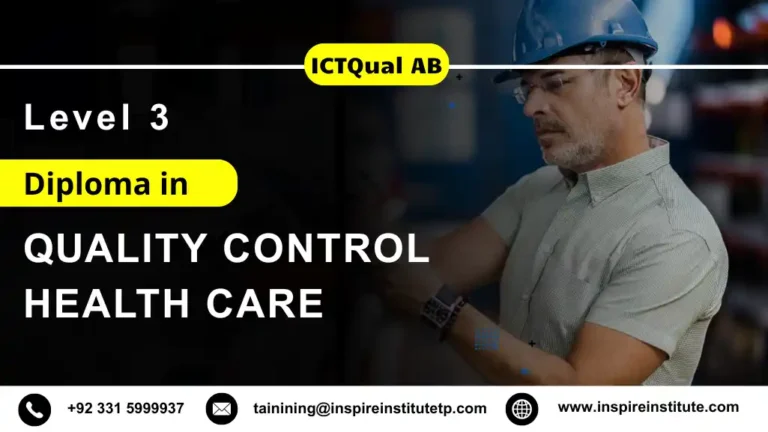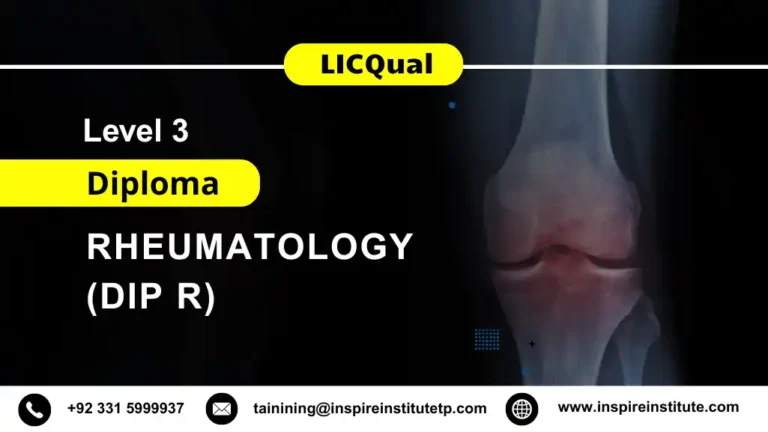LICQual Level 3 Diploma in Addiction Medicine (Dip AM)
The LICQual Level 3 Diploma in Addiction Medicine (Dip AM) is a UK-accredited qualification that addresses the growing global need for skilled professionals in addiction treatment, substance misuse management, and behavioural health care. Addiction medicine is a critical field within healthcare, focusing on the prevention, diagnosis, and treatment of substance use disorders, including alcohol, drugs, and behavioural addictions. This diploma equips learners with the theoretical knowledge and practical expertise necessary to make a meaningful impact in clinical, community, and rehabilitation settings.
The course provides a comprehensive overview of the physiological, psychological, and social aspects of addiction. Learners explore topics such as neurobiology of addiction, pharmacology of substances, mental health comorbidities, and behavioural interventions. By understanding these core concepts, graduates are prepared to deliver evidence-based, patient-centred care in various healthcare environments, including hospitals, clinics, rehabilitation centres, and community outreach programmes.
Practical application is a core component of the LICQual Level 3 Diploma in Addiction Medicine. Learners gain experience in patient assessment, intervention planning, relapse prevention strategies, and counselling techniques. The programme emphasizes early detection, clinical risk assessment, and therapeutic communication, ensuring graduates can apply best practices safely and effectively to support individuals with substance use disorders.
This UK-recognised qualification enhances professional credibility and career prospects. The diploma aligns with international standards in addiction medicine and substance misuse treatment, making it suitable for healthcare assistants, nurses, counsellors, and aspiring addiction specialists. Graduates can pursue roles in clinical support, community healthcare, and rehabilitation services or advance to higher-level studies in medicine, psychology, or public health.
The assignment-based structure allows learners to balance academic progression with professional or personal commitments. Learners benefit from flexible study options while engaging with evidence-based research, case studies, and contemporary treatment guidelines in addiction medicine. This approach ensures learners gain a thorough understanding of both theory and real-world application.
Ultimately, the LICQual Level 3 Diploma in Addiction Medicine (Dip AM) empowers learners with the knowledge, skills, and professional qualifications needed to contribute meaningfully to addiction care. By combining academic excellence, practical competence, and patient-centred approaches, graduates are prepared to improve outcomes for individuals affected by substance use and support broader public health initiatives.
Why Choose this Qualification
The LICQual Level 3 Diploma in Addiction Medicine (Dip AM) offers learners a unique opportunity to gain advanced knowledge and practical skills in addiction treatment, substance misuse management, and behavioural health care. This UK-accredited programme is designed to equip healthcare professionals, counsellors, nurses, and aspiring addiction specialists with the expertise needed to deliver evidence-based, patient-centred care. By combining theoretical foundations with practical applications, the course ensures learners develop competence, confidence, and professional credibility in the field of addiction medicine.
Key Reasons to Choose this Qualification
Specialist Knowledge
- Develop a deep understanding of the neurobiology and physiology of addiction, including the effects of substances on the brain and body.
- Gain insights into mental health comorbidities and behavioural addictions to provide holistic care.
- Learn contemporary theories of addiction and recovery models aligned with international standards.
- Acquire knowledge of pharmacological interventions, counselling approaches, and risk management strategies.
Practical Application
- Apply evidence-based assessment tools to evaluate patients with substance use disorders.
- Develop intervention plans and relapse prevention strategies suitable for clinical and community settings.
- Gain hands-on skills in therapeutic communication and patient engagement techniques.
- Learn to implement care plans that support long-term recovery and wellbeing.
Recognised Qualification
- Earn a UK-accredited diploma that validates your expertise in addiction medicine.
- Enhance professional credibility and career prospects in healthcare, rehabilitation, and community services.
- Align your skills with international addiction treatment standards and best practices.
- Improve employability across hospitals, clinics, rehabilitation centres, and NGOs.
Flexible Learning Pathway
- Benefit from an assignment-based programme that accommodates professional or personal commitments.
- Progress through modules at your own pace without compromising work or study obligations.
- Access online resources, research materials, and case studies to support self-directed learning.
- Gain practical insights while maintaining flexibility in learning schedules.
Evidence-Based Training
- Engage with the latest research, guidelines, and global best practices in addiction medicine.
- Strengthen critical thinking and clinical decision-making through evidence-based approaches.
- Develop safe, ethical, and effective patient-centred care strategies.
- Understand public health implications of substance misuse and interventions.
Career Development
- Open pathways to roles such as addiction support worker, rehabilitation assistant, or clinical care coordinator.
- Prepare for advanced studies in medicine, psychology, or behavioural health.
- Develop competencies that enhance promotion prospects and interdisciplinary collaboration.
- Expand opportunities in healthcare, social services, and public health sectors.
Enhanced Patient Care Delivery
- Deliver effective interventions for substance use disorders using clinical and psychosocial strategies.
- Improve patient outcomes through structured care planning and support systems.
- Promote recovery, resilience, and wellbeing in individuals and communities.
- Enhance patient safety and adherence through evidence-informed practices.
Professional Growth
- Strengthen communication, empathy, and interdisciplinary collaboration skills.
- Cultivate ethical awareness and professional responsibility in complex healthcare settings.
- Enhance problem-solving, clinical reasoning, and reflective practice capabilities.
- Develop confidence to manage challenging cases in addiction medicine effectively.
The LICQual Level 3 Diploma in Addiction Medicine (Dip AM) provides learners with comprehensive knowledge, practical competence, and a UK-recognised qualification. It prepares healthcare professionals and aspiring practitioners to deliver high-quality, evidence-based addiction care and contribute meaningfully to the wellbeing of individuals and communities globally.
Course Overview
LICQual UK Awarding Body
Average Completion Time:
4-12 Months
Study Units: 6 Units
Evidence & Assignment Based
Mandatory Units
Who Should Take This Course
The LICQual Level 3 Diploma in Addiction Medicine (Dip AM) is designed for individuals who want to build specialised expertise in addiction treatment, substance misuse management, and behavioural health. This UK-accredited programme provides learners with evidence-based knowledge, clinical skills, and practical tools to manage patients effectively, support recovery, and deliver high-quality, patient-centred care. It is ideal for healthcare professionals, counsellors, social care workers, and individuals aiming to advance their careers in addiction medicine or related fields.
This course is suitable for
Healthcare Professionals
- Nurses, clinical support workers, and allied health practitioners seeking to specialise in addiction medicine.
- Professionals aiming to enhance their skills in substance use assessment, intervention, and monitoring.
- Practitioners integrating addiction management into current healthcare services.
- Learners focusing on evidence-based, patient-centred care for individuals with substance misuse issues.
- Healthcare professionals preparing for leadership or specialist roles in addiction treatment.
Counsellors and Therapists
- Counsellors wishing to specialise in addiction counselling and behavioural interventions.
- Mental health professionals expanding expertise in substance use disorders.
- Therapists developing practical skills in relapse prevention and patient engagement.
- Individuals aiming to provide holistic support addressing psychological and social aspects of addiction.
- Practitioners seeking to implement evidence-based therapeutic strategies.
Medical Students and Trainees
- Medical students seeking foundational knowledge in addiction medicine alongside clinical training.
- Trainees aiming to gain practical experience in substance use disorder management.
- Students enhancing employability in healthcare, rehabilitation, and public health sectors.
- Individuals preparing for advanced studies or specialisation in psychiatry or behavioural medicine.
- Learners aiming to understand clinical pharmacology, neurobiology, and intervention strategies.
Social Care Workers
- Community support workers assisting individuals affected by substance misuse.
- Professionals implementing structured care plans and evidence-based interventions.
- Individuals promoting patient recovery, resilience, and wellbeing in community settings.
- Social care staff integrating psychosocial support with medical care.
- Practitioners aiming to improve patient outcomes in community or residential settings.
Rehabilitation and Recovery Specialists
- Professionals working in residential, outpatient, or community rehabilitation programmes.
- Practitioners enhancing competencies in treatment planning, patient monitoring, and counselling.
- Specialists aiming to support patients with relapse prevention strategies.
- Individuals integrating psychosocial and medical approaches for effective addiction care.
- Rehabilitation workers preparing for advanced roles in addiction services.
Public Health Professionals
- Professionals addressing substance misuse from a population health perspective.
- Individuals designing, implementing, and evaluating prevention programmes and community interventions.
- Workers aiming to reduce the social and health burden of addiction.
- Public health practitioners focusing on data-driven policy and evidence-based initiatives.
- Professionals preparing to contribute to health promotion and addiction awareness campaigns.
Career Changers
- Individuals transitioning into healthcare or mental health professions.
- Learners seeking structured, evidence-based training in addiction medicine.
- Professionals aiming to gain a recognised qualification to boost career opportunities.
- Individuals motivated to contribute meaningfully to patient care and community health.
- Career changers developing practical skills for roles in counselling, healthcare, or rehabilitation.
Academic and Research Aspirants
- Learners aiming to conduct research in addiction medicine, behavioural health, or psychiatry.
- Professionals interested in evidence-based practice and evaluation of addiction interventions.
- Individuals studying neurobiology, pharmacology, and recovery-focused strategies.
- Students preparing for academic or clinical leadership roles in addiction services.
- Researchers aiming to develop publications or contribute to healthcare policy in addiction care.
The LICQual Level 3 Diploma in Addiction Medicine (Dip AM) is an ideal qualification for a diverse range of learners seeking to enhance their professional knowledge, practical skills, and career prospects. Graduates will be equipped to deliver safe, effective, and compassionate addiction care while contributing meaningfully to the field of addiction medicine.
Course Benefits
The LICQual Level 3 Diploma in Addiction Medicine (Dip AM) offers substantial benefits for learners who aspire to develop professional expertise in addiction medicine, substance use disorders, and the clinical management of dependence-related conditions. By combining comprehensive theoretical instruction with practical, evidence-based applications, this UK-accredited qualification prepares learners to assess, treat, and support individuals facing addiction challenges effectively. Designed as an assignment-based programme, it provides the flexibility, academic excellence, and clinical relevance necessary to meet the growing global demand for skilled addiction healthcare professionals.
Key Benefits of the Course:
- Specialist Knowledge:
Gain a deep understanding of substance use disorders, addiction physiology, and the psychological, social, and behavioural aspects of dependency. Learners explore treatment modalities for alcohol, drugs, and behavioural addictions, including pharmacological, psychological, and holistic interventions. This knowledge equips graduates to make informed, evidence-based clinical decisions that improve recovery outcomes and promote long-term wellbeing in diverse healthcare settings. - Practical Application:
Develop essential clinical skills in assessing addiction severity, interpreting diagnostic assessments, and supporting intervention strategies. Learners gain hands-on experience in patient counselling, relapse prevention, treatment planning, and harm reduction approaches. The course ensures that graduates can confidently apply their knowledge in hospitals, rehabilitation centres, community health programmes, and counselling services. - Recognised Qualification:
Earn a UK-recognised qualification that validates professional competence and advanced knowledge in addiction medicine. This international recognition enhances employability and career progression, aligning with global healthcare standards and clinical practice requirements. The LICQual Level 3 Diploma in Addiction Medicine (Dip AM) is respected by hospitals, rehabilitation centres, NGOs, and educational institutions worldwide, reflecting its alignment with evidence-based addiction care excellence. - Flexible Learning Pathway:
This assignment-based diploma is designed to support learners balancing professional, personal, or academic responsibilities. The flexible structure is ideal for healthcare assistants, nurses, counsellors, social workers, and allied health professionals seeking to specialise in addiction medicine. Learners progress at their own pace while acquiring the theoretical insight and practical competence essential for clinical and community care roles. - Evidence-Based Training:
The programme integrates the latest research and global best practices in addiction medicine and substance abuse treatment. Learners engage with up-to-date clinical guidelines and scientific literature to strengthen assessment, intervention, and rehabilitation skills. By promoting evidence-based care, the course ensures that graduates adopt safe, effective, and ethical healthcare practices grounded in modern addiction medicine. - Career Development:
The qualification opens a wide range of rewarding career opportunities across hospitals, rehabilitation centres, public health organisations, community care programmes, and counselling services. Graduates can pursue roles such as addiction support worker, rehabilitation assistant, substance use counsellor, or patient care coordinator. Additionally, this diploma serves as a stepping stone toward advanced study in medical sciences, nursing, or public health, enhancing career progression and professional growth. - Enhanced Patient Care Delivery:
Learners acquire the skills necessary to provide comprehensive addiction support through effective assessment, treatment planning, and patient education. The programme emphasises early intervention, harm reduction, and long-term recovery strategies, ensuring learners can manage both acute and chronic addiction cases. By focusing on patient-centred care, graduates contribute to improving clients’ quality of life and reducing the societal burden of substance abuse. - Professional Growth:
The course fosters the development of critical thinking, communication, and clinical reasoning skills essential for effective healthcare delivery. Learners cultivate professional values such as empathy, integrity, and teamwork—qualities vital for working in multidisciplinary healthcare environments. Through continuous reflection and applied learning, graduates become competent, ethical, and compassionate addiction care professionals.
The LICQual Level 3 Diploma in Addiction Medicine (Dip AM) provides learners with the essential foundation to excel in the field of addiction healthcare. Through a balanced approach of academic study and practical application, it prepares healthcare professionals and aspiring practitioners to make meaningful contributions to recovery, patient safety, and public health improvement. This qualification empowers learners to advance their careers and play a vital role in promoting global addiction medicine and rehabilitation services.
Eligibility Criteria
The LICQual Level 3 Diploma in Addiction Medicine (Dip AM) is a UK-accredited qualification specifically designed for healthcare professionals, nurses, counsellors, and individuals seeking to specialise in addiction medicine and substance use management. This assignment-based programme provides a comprehensive understanding of addiction physiology, behavioural health, and the clinical management of substance use disorders. By integrating theoretical knowledge with practical application, the course equips learners with the expertise to deliver high-quality, evidence-based addiction care. Those who meet the entry requirements will be well-prepared to excel in this programme and apply their skills effectively in hospitals, rehabilitation centres, community health services, and counselling clinics.
Educational Background:
Applicants should hold a recognised qualification in healthcare, nursing, psychology, social work, or any related discipline. Candidates possessing Level 2 or Level 3 qualifications in healthcare practice, mental health, or clinical sciences are encouraged to apply. Individuals with equivalent international qualifications will also be considered, provided their credentials meet the academic and professional standards of the programme. The diploma is particularly suitable for learners with an educational background in health sciences, social care, or allied healthcare who wish to deepen their understanding and competence in addiction medicine and patient support.
Professional Experience:
Previous professional experience in addiction care, clinical healthcare, counselling, or social work is beneficial but not mandatory. A minimum of one year’s experience in healthcare, mental health, or community support—such as caregiving, nursing assistance, or addiction counselling—is recommended. Applicants who have worked in hospitals, rehabilitation centres, or community health environments will find this qualification particularly valuable. However, individuals without prior experience but with a strong motivation to pursue a career in addiction medicine are also encouraged to apply, as the course provides comprehensive foundational and practical training to build competence in this specialised field.
Age Requirement:
Learners must be at least 18 years old at the time of enrolment. This age requirement ensures that learners have the maturity, emotional intelligence, and professional responsibility necessary for studying addiction medicine, which involves sensitive topics such as substance abuse, mental health, and ethical patient management. The programme demands a high level of commitment, critical thinking, and empathy, aligning with professional standards for adult healthcare education and clinical learning.
Language Proficiency:
As the LICQual Level 3 Diploma in Addiction Medicine (Dip AM) is delivered and assessed in English, learners must demonstrate strong proficiency in reading, writing, and communication. Non-native English speakers are expected to hold an IELTS score of at least 6.0 or an equivalent qualification. This ensures learners can engage with technical course materials, complete written assignments, and communicate professionally with patients, healthcare professionals, and academic mentors. Strong English proficiency also supports accuracy in documentation and the delivery of clear, patient-centred care within clinical and community addiction services.
Technical Requirements:
Applicants should have access to a personal computer or laptop with a reliable internet connection to participate effectively in the online learning process. Basic IT literacy is essential, including familiarity with word processing software, digital research tools, and online learning platforms. Since this qualification is assignment-based, learners are required to submit coursework electronically and engage in self-directed study using digital resources. The flexible online structure supports learners in managing their education alongside personal and professional responsibilities.
Required Documents:
To complete the registration process, applicants must submit a valid passport or national identification card for identity verification, along with proof of educational qualifications such as certificates or academic transcripts. Evidence of any professional or healthcare experience should also be provided where applicable. International candidates may be required to submit certified translations of their academic or professional documents to verify authenticity and eligibility. These requirements ensure that all applicants meet the academic, linguistic, and professional standards necessary for successful enrolment in the programme.
The Qualification Process
LICQual Level 3 Diploma in Addiction Medicine (Dip AM) ,follows a structured pathway to ensure learners gain comprehensive knowledge, practical skills, and professional competence in community oral healthcare.
Step 1: Self-Assessment
Learners review the entry requirements to confirm eligibility. Candidates with a background in dentistry, oral health, or public health are encouraged to apply.
Step 2: Registration
Complete the registration process by submitting required documents such as proof of qualifications, a valid ID, and payment of enrollment fees.
Step 3: Induction
An induction session is conducted to:
- Verify learner eligibility and documentation.
- Introduce study materials, learning outcomes, and assessment procedures.
Step 4: Learning and Evidence Submission
Learners complete assignments, case studies, and practical exercises demonstrating competence in public health dentistry, community oral health assessment, preventive strategies, and program planning.
Step 5: Feedback and Revision
Assessors review submitted evidence and provide constructive feedback. Learners can revise and resubmit work to meet all required standards.
Step 6: Competence Validation
Final submissions are evaluated to confirm that learners have met all theoretical and practical learning outcomes.
Step 7: Internal Quality Assurance (IQA)
The IQA team reviews the assessment process to ensure accuracy, fairness, and compliance with international standards.
Step 8: External Verification (EQA)
External verifiers validate the authenticity and quality of learner achievements.
Step 9: Certification
Upon successful verification, learners are awardedLICQual Level 3 Diploma in Addiction Medicine (Dip AM) , demonstrating advanced proficiency in community oral healthcare and preparing them for professional growth in dental public health, preventive dentistry, and healthcare policy.







